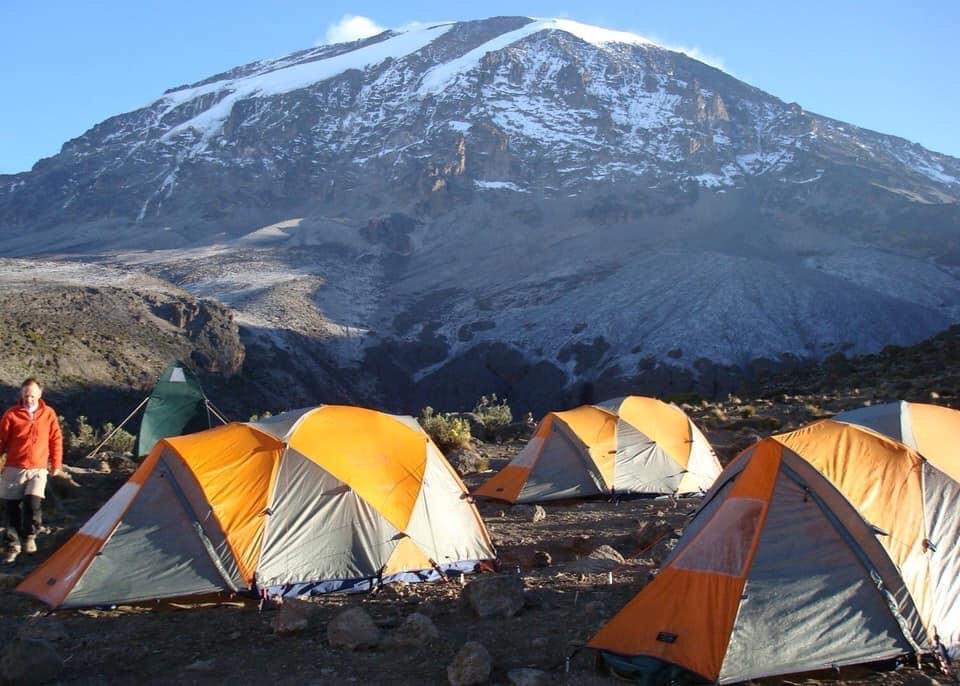ACCOMODATION ON THE MOUNTAIN
We normally us e the very best high altitude mountain tents, to ensure you stay warm, dry and comfortable on your Kilimanjaro climb. They are designed to sleep three people, but we only ever sleep 2 to a tent, to ensure you have plenty of space for you and your gear. Keep in mind, these are proper mountain tents, designed to cope with extreme conditions so don’t expect to be able to stand up and walk around inside.

KILIMANJARO DAILY CLIMBING ROUTINE
Each morning, your guide will wake you up between 7:00 or earlier than that to a hot drink and warm water for a wash. After that, you’ll need to get your kit and other belongings packed. Breakfast is served between 8:00 and 8:30, while the team packs your tent away, ready to be taken to the next camp. As you eat breakfast, your guides will brief you on the plan for the day’s climb and perform a health review for each client. They will also address any questions or concerns you may have. And after that you will heard to the next camp.
Your porters will finish striking camp as you set off, and will leave some time after you do. Despite this, they will pass you at some point during the day’s hike and have your camp set up and waiting when you arrive.
When you arrive at the next camp, there will be hot water for a quick wash, and hot drinks and snacks waiting. You will generally have time for a short acclimatization trek before dinner, in order to get used to the high altitude.
After dinner there will be time for a debriefing on the day’s climb with your guides, and to discuss anything that might be on your mind. If you are having any trouble or discomfort, please do let your guides know. Most problems can be sorted out easily on the mountain, but only if you let us know.
FOOD ON THE MOUNTAIN

KILIMANJARO MEALS PLANS
Knowing that the climbers need to be well fed and hydrated the whole time during the climb it absolutely vital that you eat and drink as much as possible of yummy and delicious fresh and organic food provided by our mountain chef.
You will have fresh meat for the first part of the trek and on the southern routes where it is feasible we resupply the group at Baranco or Karanga Camp.
After your summit ascent, we'll have breakfast and refreshment ready and waiting for you when you arrive back at Base Camp
If you have special dietary requirements or are a vegetarian/vegan then just let us know when you book so that we can be sure to have a suitable menu planned for you.
Meals on Kilimanjaro
Breakfast is usually fairly hearty, and includes porridge, sausage, eggs and toast with marmalade or jam. Of course, you’ll also have hot drinks, generally a choice of tea, coffee or hot chocolate. Let your guide know if you are still hungry, or even if you think you could ‘pack in a few more bites’. Our cooks always try to provide more food than necessary to ensure everyone gets a good meal.
Lunch is either packed for you, to carry in your rucksack, or we stop for a hot cooked lunch depending on your itinerary. A typical packed lunch is a boiled egg, sandwiches, a portion of chicken, snack bar, fresh fruit and a drink.
Afternoon Tea is served at the end of the day's walking, once you get to camp. In addition to tea and other hot drinks, there are plenty of peanuts, popcorn, biscuits and snacks to help restore some of the energy you’ve just burned off during the hike.
Dinners are quite filling. They normal begin with a nice hearty soup, and then a main course such as chicken curry, spaghetti bolognese, fresh vegetables, and plenty of rice, pasta or potatoes, followed by a yummy dessert
We understand how much comfort there is to be had in a little taste of home. We make an effort to supply many brands that will be familiar to different climbers of different background including Heinz, Nestlé and Nescafe.
SAFETY ON THE MOUNTAIN
Our safety measures starts before you even arrive on the mountain this begins with planning routes that ensure good acclimatization. On average our climbing guides have made it to the summit over 100 times each and with more than thirty years of combine experience.
Our climbing and safari guides are all internationally WAFA (Wilderness First Aid) Certified and have taken a special course on issues related to acclimatization.
We organize about 150 climbs a year and use quality 4 season tents imported from the US. On every climb our guides carry oxygen pulse oximeters to monitor your oxygen saturation since oxygen is the key indicator of health deterioration on high altitude and at sea level oxygen saturation should be close to 100% but at altitude will safely drop to about 90%. If you go below this we take it as a warning sign to monitor you very closely for further symptoms of altitude sickness.
TIPPING
As a varied custom all over the world, tip is a practice that we have accept on the tourism business in Tanzania and it should not be taken as the substitute of wages since our crew member are well taken care of and well compensated.
You may be wondering how much you should be given as tip. Well for groups of three or more for a six or seven day climb, tips work out to between $250 and $300 in total per climber. Longer climbs would be a bit more, and shorter climbs perhaps a bit less, at your discretion. This might sound a lot but bear in mind that with a group of 10 climbers, your crew will number over 40.
Prior to your climb we will provide you with a copy of the tip recommendation for your group, based on an estimated crew number. The actual size of your crew can only be confirmed on the first day of the climb once all the bags and equipment have been weighed at the park gate, and you will be advised of the final number of crew at your first campsite.